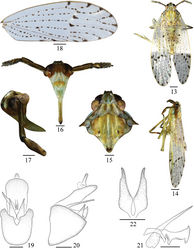Purohita
| Notice: | This page is derived from the original publication listed below, whose author(s) should always be credited. Further contributors may edit and improve the content of this page and, consequently, need to be credited as well (see page history). Any assessment of factual correctness requires a careful review of the original article as well as of subsequent contributions.
If you are uncertain whether your planned contribution is correct or not, we suggest that you use the associated discussion page instead of editing the page directly. This page should be cited as follows (rationale):
Citation formats to copy and paste
BibTeX: @article{Li2019ZooKeys855, RIS/ Endnote: TY - JOUR Wikipedia/ Citizendium: <ref name="Li2019ZooKeys855">{{Citation See also the citation download page at the journal. |
Ordo: Hemiptera
Familia: Delphacidae
Name
Purohita Distant, 1906 – Wikispecies link – Pensoft Profile
- Purohita Distant, 1906: 470; Ishihara 1949[1]: 86; Tian 1983[2]: 43; Yang and Yang 1986[3]: 64; Ding 2006[4]: 201.
Type species
Purohitacervina Distant, 1906, by original designation.
Diagnosis
Head including eyes narrower than pronotum. Vertex narrow, quadrate, slightly extending in front of eyes; lateral carinae strongly ridged, foliate, prominent anteriorly, submedian carinae transverse, median carina obsolete. Frons in middle line longer than wide at widest part about 1.5–2.3: 1, lateral margins divergent apically, median carina forked near base. Postclypeus tricarinate. Antennae very large, first segment flattened, rectangular, longer in middle line than widest part about 2.9–3.3: 1, with central ridge distinct, surface on each side of central ridge obliquely reclined, second segment much shorter than the first about 1: 1.4–2.5. Eyes in dorsal view with lateral side emarginate medially distinctly. Ocelli distinct. Pronotum short, scarcely longer than vertex, tricarinate, lateral carinae attaining hind margin. Mesonotum longer than vertex and pronotum together, tricarinate. Spinal formula of hind leg 5-6-4 or 5-7-4. Wings with M and Cu1 fused except very short portion at base.
Anal segment large, broad, dorsum flattened and lateroapical angles without process. Pygofer slightly compressed laterally, medioventral processes present or absent. Aedeagus with phallus relative long, phallobase process arising from base, directed ventrad, blunt oval or forked at apex. Diaphragm and lateral areas membranous. Without sclerotized margin of opening of genital styles. Seventh abdominal sternite of female present or absent, genital styles narrow and slender, simple.
Plant associations
Bamboo.
Distribution
Oriental region.
Key to species (males) of Purohita from China (modified from Ding 2006)Taxon Treatment
- Li, H; Yang, L; Chen, X; 2019: Two new species of the bamboo-feeding planthopper genus Purohita Distant from China (Hemiptera, Fulgoromorpha, Delphacidae) ZooKeys, 855: 85-94. doi
Images
|
Other References
- ↑ Ishihara T (1949) Revision of the Araeopidae of Japan, Ryuku Islands and Formosa (Hemiptera).Scientific Reports of the Matsuyama Agricultural College2: 1–102. [17 pls]
- ↑ Tian (1983) Purohita Distant In: Kuoh CL, Ding JH, Tian LX, Huang CL (Eds) Economic Insect Fauna of China. Fasc. 27, Homoptera, Delphacidae. Science Press, Beijing, 41.
- ↑ 3.0 3.1 3.2 3.3 Yang J, Yang C (1986) Delphacidae of Taiwan (I) Asiracinae and the tribe Tropidocephalini (Homoptera: Fulgoroidea).Taiwan Museum Special Publication6: 64–76.
- ↑ 4.0 4.1 4.2 4.3 Ding J (2006) Fauna Sinica. Insecta Vol. 45. HomopteraDelphacidae. Science Press, Beijing, 201–209.
- ↑ Huang C, Tian L, Ding J (1979) A new genus and some new species of Delphacidae attacking bamboos in China.Acta Zootaxonomica Sinica4(2): 170–181.

